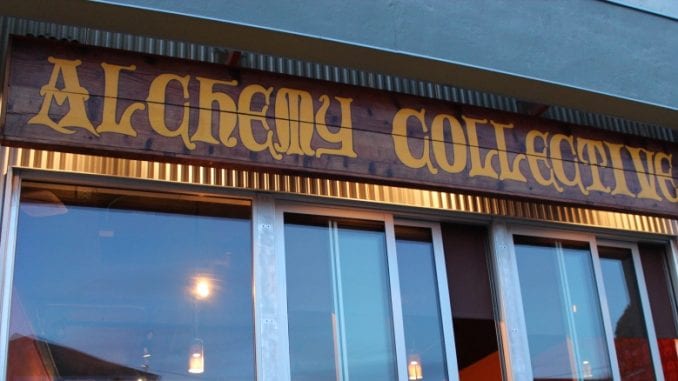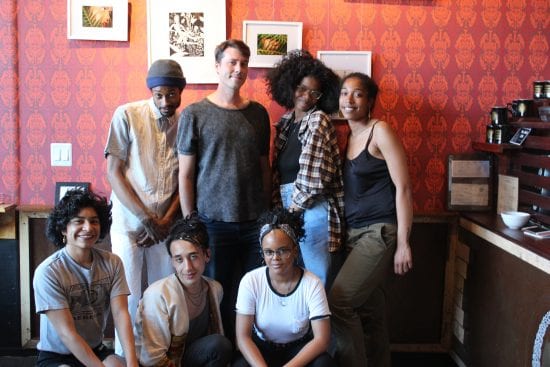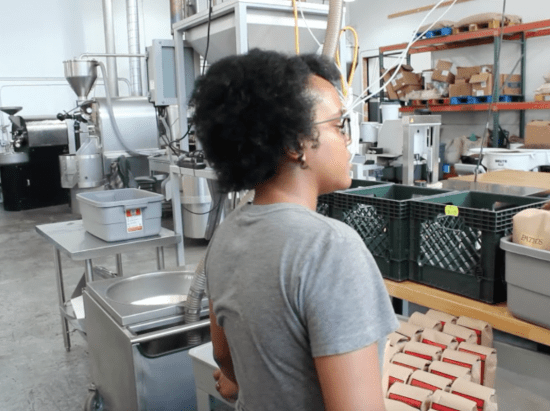
Alchemy Coffee shares how they create pathways for every one of their employees to become a partial owner of the retailer-roaster in Berkeley, Calif.
BY RJ JOSEPH
SPECIAL TO BARISTA MAGAZINE
In this series, we highlight cooperatively run coffee shops and explore the details of what makes co-ops tick. To learn more about the co-op model, read our feature in the the October + November issue of Barista Magazine.
Since 2010, Alchemy Collective has been roasting and serving great coffee to the Berkeley, Calif., community. Founded by Chris Taruc-Myers, Payam Imani, and James Parrish, Alchemy’s core mission has always been to make amazing coffee, foster community, and provide dignified jobs in which workers have control over their work environment. “We really believe in the cooperative movement,” Chris told me. “We aimed to become a business that others could look to and say, ‘We could do that. We could be a cooperative like Alchemy.’”

Structure
The actual functions of Alchemy aren’t too unlike those of a conventionally structured roaster-retailer. Rather than departments, all the work is split up into committees, and rather than each committee having a manager, it has a “bottomliner” or lead, who is ultimately accountable for making sure the work gets done. The model offers some fluidity and growth opportunity not often available in other businesses: Each co-op member is encouraged to participate in two to three committees, allowing them to learn a diverse skill set and gain a thorough 360-degree understanding of process. “Currently, we don’t assign people to committees,” Chris told me. “People just file into them according to desire, experience, and need.”
Decisions
Alchemy requires members to have at least one one business meeting a month in which members can vote on proposals and bring up issues. For greater flexibility, they sometimes vote on urgent matters or meeting spillover via email or Slack. “Our bylaws state that a minimum of two-thirds vote is required to pass a proposal,” said Chris. “But in practice, the group can ask for a higher (but never lower) percentage vote to pass, so for the entire time we’ve been in business, we have used full consensus to make decisions.” Sometimes, folks choose not to vote one way or the other rather than voting against and blocking proposals.

On a micro level, committees are granted authority by the whole group to make smaller decisions autonomously without having to make a proposal to the group and call a vote. “The assumption is that the committee knows what it’s doing and no one will have an issue with the minor decision. If someone does have an issue with it, then it becomes a conversation and vote,” said Chris.
Finances
Pay structures at Alchemy look fairly similar to a more conventional company, but with profit-sharing and easier pathways to increasing one’s wage. Everyone starts out with a basic hourly wage; then, as workers take on extra responsibilities (anything from bookkeeping to roasting to picking up groceries), they gain a higher hourly wage. At the end of each quarter, if there is a surplus in the bank, each member gets a percentage based on hours worked.
Pathway to Ownership
All new hires have a chance to work toward membership. New hires can only be voted in as members after six months and 500 hours of logged work. Once folks become a member, they are entitled to vote and receive patronage payouts (profit-sharing based on hours worked). “Everyone we hire is on track to become a member/owner because we know that our business is stronger when workers are more invested,” says Chris.

Challenges
Alchemy’s biggest challenges come from finding the right people. “When we hire people, we have to make sure they will be not just a good worker, but someone who can work cooperatively, who knows when to yield and when to speak up,” says Chris. “It has to be someone you can trust with an equal share of your business, which requires a great deal of faith.”
The process also includes failsafes. “If the group is not 100 percent certain of granting membership to a worker by the end of the trial period, we compile a report of things the group is concerned about, and we can extend the trial process by another month to give them time to convince us they’re a good fit.” In addition, the group can decide it’s just not a good fit.
In worse scenarios, either members who aren’t a good fit slip through the cracks, or (as so often happens in conventional businesses) members reach a point where they’re no longer a good fit. “The most difficult and unpleasant is when we’ve had to terminate membership,” says Chris. “By the time someone becomes a member, it’s like they’re part of the family; we’re bound together, sharing this strange experience together on an equal level, sharing personal things with each other on shift or at meetings. It’s an intimate relationship. So when the group decides to terminate membership, it’s a big deal, and it’s painful for everyone.”
Benefits
Some of the biggest inspirations for the Alchemy team are the ability to be their own boss, their ability to actually participate in and grow a truly democratic structure, and their ability to provide pathways to entrepreneurship to the wider community.
“We have it drilled into us that we live in a democracy, but our democracy is so big, abstract, and flawed. It’s exhilarating to participate in the making of important decisions—often ones that will fundamentally change the business—and to see change happen so quickly and fluidly,” says Chris. In addition, Alchemy is able to provide workers with an inroad to business ownership. “Few workers that we bring on ever thought they would, or could, own a business. No one comes on with that experience, but we teach them as they join to be entrepreneurs. We go over finance reports together, crunch numbers, hash out tough decisions, and we gradually give new people responsibilities such as ordering, delivery, setting up vendor accounts, etc., so that we all carry the weight and responsibility of ownership together. It’s a beautiful thing to watch a new member go from timidly participating in a business meeting, to bringing in strong proposals and sparking ideas and discussions that will make the business stronger.”
Overall, despite the challenges that come with running a collective, Chris has plenty of inspiration to keep growing. “Our co-op is not perfect, but I can’t help but think, as we evolve and thrive, that Alchemy is a glimpse at what a better, more just, more human world could look like. At the very least we believe it’s what a better business can look like.”
 ABOUT THE AUTHOR
ABOUT THE AUTHOR
RJ Joseph roasts coffee and writes a blog called Queer Cup in addition to her other adventures in coffee journalism. Her writing focuses primarily on equity, workers’ rights, and alternatives to the status quo. In her free time she loves cooking, reading, and being in Oakland, Calif. You can follow her on Instagram and Twitter.

